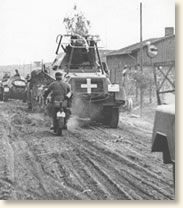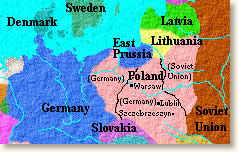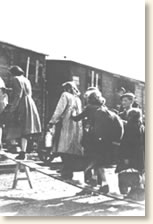|
The Nazi Occupation of Poland
At dawn on September 1, 1939, the German army launched a ferocious assault across the Polish border. The Luftwaffe sent its bombers and fighters to attack airfields, rail heads, troop concentrations or anything else considered important to the command and movement of the Polish armed forces. The first Blitzkrieg had begun. One hour later German troops attacked from the north and south intent on encircling the Polish army. The Poles fell back only to find German troops in their rear.
 |
A German armored column
crosses the Polish border
Sept. 1, 1939
|
Two days later, honoring their obligations to Poland, France and Britain declared war on Germany. This was of no help to Poland. The final blow came on September 17 when Soviet forces, under terms of a secret agreement with Germany, marched in from the East. Warsaw surrendered on September 27. By October 6, it was all over. Poland ceased to exist as a country. World War II had begun.
Poland was immediately divided between the Soviets and Nazi Germany. The Soviets
absorbed the eastern portion including Byelorussia and the West Ukraine. The
Germans declared the western portion of Poland a part of Greater Germany. The
portion in the middle including Warsaw was declared a German colony ruled from
the city of Krakow by Hans Frank.
In June 1941, Hitler attacked the Soviet Union and by winter the German army stood before the gates of Moscow. The resilience of the Soviet army and the severity of the Russian winter combined to turn the tide and by the summer of 1943 the German army was retracing its steps back to Poland. The city of Lublin fell to the Soviets in July 1944. Warsaw fell the following January and the Nazis driven out of the remainder of Poland. Unfortunately, the Poles found that their "liberation" did not lead to freedom but meant only the substitution of their Nazi masters by a Soviet regime.
Dr. Zygmunt Klukowski was the chief physician of a small hospital in the village of Szczebrzeszyn south of the city of Lublin. An enthusiastic diarist, the doctor daily chronicled the Nazi occupation as events unfolded outside the window of his residence at the hospital. Discovery of his observations would have meant instant death. He therefore carefully concealed his manuscripts often changing their hiding place during five years of Nazi occupation. His extraordinary diary was published in Poland in 1959 shortly before his death and subsequently translated into English.
The town is crowded with Germans. They are quartered in all the larger houses. Most of them are from Austria and some from Vienna. In general the Germans are trying to clean up the city. For this work they are using only Jews. Jews must sweep the streets, clean all the public latrines, and fill all the street trenches. Plastered everywhere are German notices giving an idea of what we can expect in the future.
We must return all arms. We must record all contagious diseases. The police curfew is from 10 P.M. until 5:30 A.M. The restrictions applying to Jewish shops change from day to day. Sometimes the Jews are allowed to open their shops, and sometimes they are not. It seems that most of the orders are aimed at the Jews.
I met a woman, an official of the Zamoyski estate. She had just arrived from Chelmo. For some time I've been receiving alarming information about the execution of the mentally ill patients of the psychiatric ward at Chelmo Hospital. I asked her if this happened. She verified that it was true.
All the mentally ill were shot with machine guns, but under penalty of death the hospital personnel are forbidden to talk about this crime.
It is so hard to believe anything as terrible as this.
 |
Poland after its partition between
Germany and the Soviet Union
1939-1941
|
"Today I planned to try to go to Zamosc again. I woke up very early to be ready, but around 6 A.M. I heard noise and through the window saw unusual movement. This was the beginning of the so-called German displacement of the Jews, in reality a liquidation of the entire Jewish population in Szczebrzeszyn.
"From early morning until late at night we witnessed indescribable events. Armed SS soldiers, gendarmes, and 'blue police' ran through the city looking for Jews. Jews were assembled in the marketplace. The Jews were taken from their houses, barns, cellars, attics, and other hiding places. Pistol and gun shots were heard throughout the entire day. Sometimes hand grenades were thrown into the cellars. Jews were beaten and kicked; it made no difference whether they were men, women, or small children.
"By 3 P.M. more than 900 Jews had been assembled. The Germans began moving them to the outskirts of the city. All had to walk except for members of the Judenrat and the Jewish police; they were allowed to use horse-drawn wagons. The action didn't stop even after they were taken out of town. The Germans still carried on the search for Jews. It was posted that the penalty for hiding Jews is death, but for showing their hiding places special rewards will be given.
"All Jews will be shot. Between 400 and 500 have been killed. Poles were forced to begin digging graves in the Jewish cemetery. From information I received approximately 2,000 people are in hiding. The arrested Jews were loaded into a train at the railroad station to be moved to an unknown location.
"It was a terrifying day, I cannot describe everything that took place. You cannot imagine the barbarism of the Germans. I am completely broken and cannot seem to find myself.
"We received news of robberies increasing everywhere. During the last few weeks the incidence of rape has also increased. I have already examined many pregnancies. A few days ago the wife of a well-known farmer and later a young schoolteacher came in for examination."
 |
Jews are loaded into
freight cars
Krakow, Poland
|
"The action against the Jews continues. The only difference is that the SS has moved out and the job is now in the hands of our local gendarmes and the 'blue police.' They received orders to kill all the Jews, and they are obeying them. At the Jewish cemetery huge trenches are being dug and Jews are being shot while lying in them. The most brutal were two gendarmes, Pryczing and Syring.
"The Jews that were moved yesterday out of Szczebrzeszyn were held at the Alwa plant. Around 9 P.M. another group of Jews from Zwierzyniec were brought in. Today around noon all were loaded into railroad cars, but by 4 P.M. the train had not moved. It is very cold and rainy. After the Jews were loaded into the cars, factory workers collected and brought to an assembly area money, gold, jewelry, and pearls.
"In town some of the Jewish houses were sealed by the gendarmes, but others were left completely open, so robberies took place. It is a shame to say it but some Polish people took part in that crime. Some people even helped the gendarmes look for hidden Jews. The Germans even killed small Jewish children. It is hard to describe.
"It is so terrible that it is almost impossible to comprehend. Legally the Jews don't exist in Szczebrzeszyn anymore, but still many Jews are in hiding. All will be killed sooner or later. I went to city hall today. The total number of Jews killed - they call them disabled - is unknown. Even the best specialists were exterminated. We can feel the shortage of good mechanics."
"I was told about an occurrence in Jozefow. A young man, Konrad Bartozewski, and officer of the Home Army known as 'Wir,' was arrested along with another officer, Hieronim Miac ('Kosarz'). Young Bartozewski, the son of a veterinary doctor, was put in jail. But after a few hours people from the forest came and liberated both of them. After this happened a detachment of German gendarmes came to Jozefow and arrested the entire Bartozewski family. The Germans assembled them near city hall, then in full view of thousands of people, the old veterinarian, his wife, and daughter were executed. Sixty more people were jailed.
"I was told by Mayor Kraus that during his visit to Bilgoraj he learned about a partisan raid in Huta Krzeszowska, where four policemen were killed and one was wounded in the head.
"In Szczebrzeszyn it was announced by the Germans that all traffic on the highway
to Zwierzyniec will stop for three days because of military exercises in the
nearby forest. People are now fearing new arrests and deportations to Germany."
"On Monday, March 15, during the late evening, between 7 P.M. and 8 P.M., a raid at Rapy took place. The lumber mill and railroad station were burned down. The car of Treubander Becker was shot at. In Rozaniec the new owner of a large farm, a German, was killed. The military barracks were burned down. In retaliation the Germans set the entire village of Rozaniec on fire. More than 800 people were arrested and taken to the barracks in Zwierzyniec, mostly women and children. There is talk of the possibility of freeing those jailed by armed action. We are sure the Germans will begin evacuation action against other villages very soon.
"The information from the Eastern Front does not give us too much hope for a quick end to the war. Tension is mounting, particularly among the young people."
References:
Kennedy, R.M., The German Campaign in Poland, 1939 (1956); Klukowski, Zygmunt, Diary from the Years of Occupation 1939-1944 (1993); Rudnicki, K.S., The Last of the War Horses (1974)
How To Cite This Article:
"The Nazi Occupation of Poland," EyeWitness to History, www.eyewitnesstohistory.com (1997).
| 





